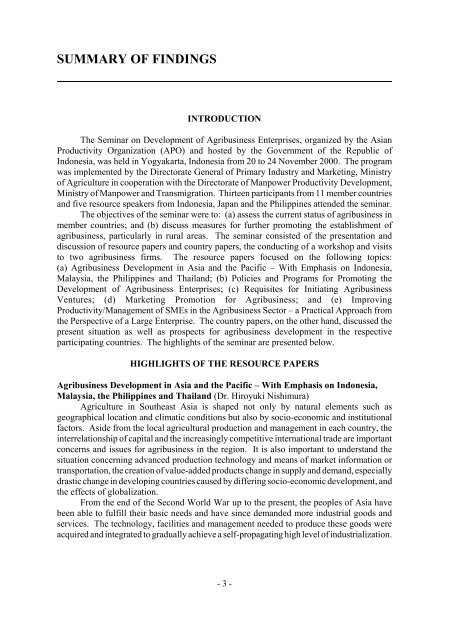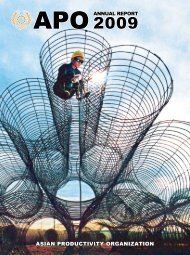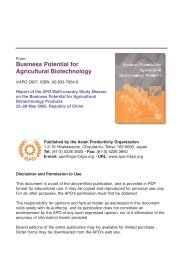Development of Agribusiness Enterprises - Asian Productivity ...
Development of Agribusiness Enterprises - Asian Productivity ...
Development of Agribusiness Enterprises - Asian Productivity ...
Create successful ePaper yourself
Turn your PDF publications into a flip-book with our unique Google optimized e-Paper software.
SUMMARY OF FINDINGS<br />
INTRODUCTION<br />
The Seminar on <strong>Development</strong> <strong>of</strong> <strong>Agribusiness</strong> <strong>Enterprises</strong>, organized by the <strong>Asian</strong><br />
<strong>Productivity</strong> Organization (APO) and hosted by the Government <strong>of</strong> the Republic <strong>of</strong><br />
Indonesia, was held in Yogyakarta, Indonesia from 20 to 24 November 2000. The program<br />
was implemented by the Directorate General <strong>of</strong> Primary Industry and Marketing, Ministry<br />
<strong>of</strong> Agriculture in cooperation with the Directorate <strong>of</strong> Manpower <strong>Productivity</strong> <strong>Development</strong>,<br />
Ministry <strong>of</strong> Manpower and Transmigration. Thirteen participants from 11 member countries<br />
and five resource speakers from Indonesia, Japan and the Philippines attended the seminar.<br />
The objectives <strong>of</strong> the seminar were to: (a) assess the current status <strong>of</strong> agribusiness in<br />
member countries; and (b) discuss measures for further promoting the establishment <strong>of</strong><br />
agribusiness, particularly in rural areas. The seminar consisted <strong>of</strong> the presentation and<br />
discussion <strong>of</strong> resource papers and country papers, the conducting <strong>of</strong> a workshop and visits<br />
to two agribusiness firms. The resource papers focused on the following topics:<br />
(a) <strong>Agribusiness</strong> <strong>Development</strong> in Asia and the Pacific – With Emphasis on Indonesia,<br />
Malaysia, the Philippines and Thailand; (b) Policies and Programs for Promoting the<br />
<strong>Development</strong> <strong>of</strong> <strong>Agribusiness</strong> <strong>Enterprises</strong>; (c) Requisites for Initiating <strong>Agribusiness</strong><br />
Ventures; (d) Marketing Promotion for <strong>Agribusiness</strong>; and (e) Improving<br />
<strong>Productivity</strong>/Management <strong>of</strong> SMEs in the <strong>Agribusiness</strong> Sector – a Practical Approach from<br />
the Perspective <strong>of</strong> a Large Enterprise. The country papers, on the other hand, discussed the<br />
present situation as well as prospects for agribusiness development in the respective<br />
participating countries. The highlights <strong>of</strong> the seminar are presented below.<br />
HIGHLIGHTS OF THE RESOURCE PAPERS<br />
<strong>Agribusiness</strong> <strong>Development</strong> in Asia and the Pacific – With Emphasis on Indonesia,<br />
Malaysia, the Philippines and Thailand (Dr. Hiroyuki Nishimura)<br />
Agriculture in Southeast Asia is shaped not only by natural elements such as<br />
geographical location and climatic conditions but also by socio-economic and institutional<br />
factors. Aside from the local agricultural production and management in each country, the<br />
interrelationship <strong>of</strong> capital and the increasingly competitive international trade are important<br />
concerns and issues for agribusiness in the region. It is also important to understand the<br />
situation concerning advanced production technology and means <strong>of</strong> market information or<br />
transportation, the creation <strong>of</strong> value-added products change in supply and demand, especially<br />
drastic change in developing countries caused by differing socio-economic development, and<br />
the effects <strong>of</strong> globalization.<br />
From the end <strong>of</strong> the Second World War up to the present, the peoples <strong>of</strong> Asia have<br />
been able to fulfill their basic needs and have since demanded more industrial goods and<br />
services. The technology, facilities and management needed to produce these goods were<br />
acquired and integrated to gradually achieve a self-propagating high level <strong>of</strong> industrialization.<br />
- 3 -
















